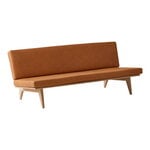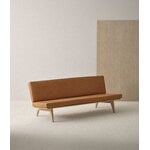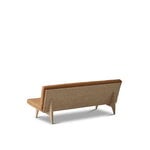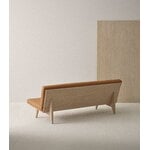Ornäs' Åre is an elegant and timeless sofa originally designed by Carl-Gustaf Hiort af Ornäs in 1958. The Scandinavian modern sofa charms with its sculptural appearance, where every element has been considered to the smallest detail, as is typical of Hiort af Ornäs' design. The sofa's elegant oak back ensures that the three-seater does not have to be placed against a wall, but can be positioned in the middle of the room – either as a practical room divider or just as a charming eye-catcher! The sleek look of the leather sofa is crowned by a beautifully sculpted foot. Like other Ornäs products, the Åre sofa is handcrafted in Finland.





Åre 3-seater sofa, oak - cognac leather
Ornäs
Description
Ornäs' Åre is an elegant and timeless sofa originally designed by Carl-Gustaf Hiort af Ornäs in 1958. The Scandinavian modern sofa charms with its sculptural appearance, where every element has been considered to the smallest detail, as is typical of Hiort af Ornäs' design. The sofa's elegant oak back ensures that the three-seater does not have to be placed against a wall, but can be positioned in the middle of the room – either as a practical room divider or just as a charming eye-catcher! The sleek look of the leather sofa is crowned by a beautifully sculpted foot. Like other Ornäs products, the Åre sofa is handcrafted in Finland.
Product details (12)
- Colour
- Oak, cognac
- Width
- 74.02 in (188 cm)
- Depth
- 30.31 in (77 cm)
- Height
- 29.13 in (74 cm)
- Seat depth
- 21.26 in (54 cm)
- Seat height
- 16.14 in (41 cm)
- Frame material
- Varnished oak
- Seat cushion
- Foam
- Upholstery fabric
- Cognac leather
- Weight
- 110.23 lbs (50 kg)
- Removable cover
- No
- Care instructions
- Wipe wooden parts with a damp cloth.
- Product ID
Designer
Carl-Gustaf Vilhelm ”Nalle” Hiort af Ornäs (1911–1996) was a Finnish interior architect and designer, whose most famous design is the Siesta armchair from 1952. In 1945 Hiort af Ornäs founded the furniture company Puunveisto Oy, for which he developed versatile techniques for shaping plywood. Hiort af Ornäs spent his retirement in Spain, and designed several buildings for Fuengirola’s Los Pacos neighborhood, which has a large Finnish population.
View all productsReviews (0)
Sustainability
The Product Sustainability Framework, our criteria of sustainable design, helps you find the most sustainable products in our selection. Read below which sustainability criteria this product has met.
Working conditions & labour 4/9
-
Equal opportunities for all employees
-
Commitment to UN Global Compact, fair compensation for all employees
-
Corporate responsibility requirements defined and communicated for suppliers
-
Systematic work for improved inclusion and well-being in the workplace
-
Transparent supply chain
-
Suppliers' compliance to a code of conduct ensured
-
Direct suppliers audited and certified
-
Compliance to the UN Guiding Principles on Business and Human Rights ensured in the supply chain
-
Support for community involvement in the supply chain
Eco-friendly production 5/9
-
Fair and resource-wise water-use in production
-
No incineration or landfilling of returned items
-
No use of endangered species as materials
-
No direct environmental emissions or waste (excl. GHGs) from production
-
Material-efficient and ecological packaging
-
The sustainability of direct suppliers' production is addressed and monitored
-
Production and material sourcing that respect biodiversity, animal rights, and natural ecosystems
-
Positive impact on nature’s well-being through operations that regenerate natural ecosystems
-
No potentially harmful chemicals used in own production
Climate impact 4/8
-
Company's direct greenhouse gas emissions identified and commitment to reduction
-
Product's carbon impact identified and commitment to reduction
-
Guidance on energy- and eco-efficient use of the product
-
100 % renewable energy in own production and operations
-
Contribution to climate initiatives beyond the brand’s direct operations
-
Low-carbon or compensated transportation
-
Carbon footprint of the product calculated and goals set to reduce it
-
Carbon neutral or carbon negative product
Sustainable materials 5/6
-
Sustainable and long-lasting material choices
-
No harmful or hazardous substances
-
Responsible raw material sourcing and production
-
Materials suited for circularity: monomaterials, recyclable finishings, renewable or recycled contents etc.
-
Ecological materials: natural, biodegradable, recyclable or recycled contents
-
Outstanding materials in terms of innovativeness, responsibility, sustainability and circularity: local production or sourcing, 100 % recycled content, C2C-certification etc.
Circular design 5/5
-
High aesthetic quality promoting long-term use of the product
-
Technically durable product design and material choices
-
Design for enduring life-long quality
-
Design and support for product maintenance, repair and upgradability
-
Innovative circular design solutions: circular service system, resale platform, remanufacturing, collection of used products, etc.








